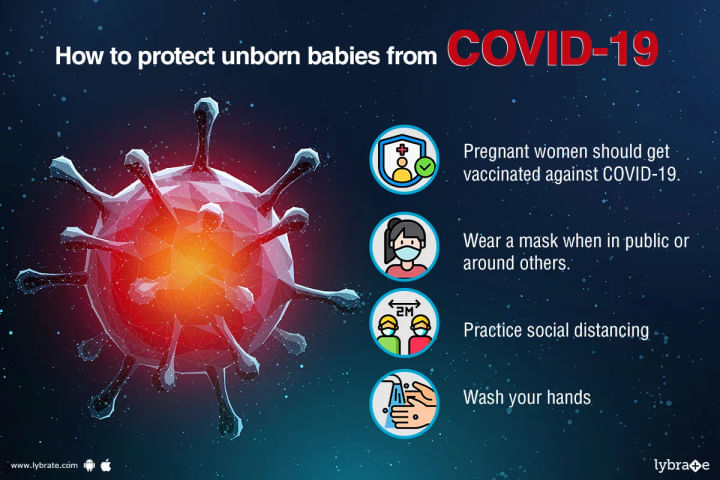How does Covid affect pregnancy?
The Covid-19 pandemic has presented never-before-seen difficulties for expectant women and their families. From navigating new protocols for childbirth and prenatal care, to facing potential exposure to the virus and its potential effects on pregnancy, the time has been a difficult one for expectant mothers. With unknowns and added stressors, it's important to consider how it may be impacting various aspects of our lives, including pregnancy.
Expecting mothers may be particularly concerned about how the virus could potentially affect their own health and the health of their unborn child. With mounting uncertainty and constant changes in guidelines and recommendations, it's understandable to have questions about how Covid-19 affects pregnancy.
In this article, we'll explore the current state of knowledge about Coronavirus and pregnancy, including potential risks and recommendations for expecting mothers. It's worth noting that the information on this topic is constantly evolving, and it's important to follow guidance from trusted health organizations and medical professionals.
Understanding Covid-19 and Pregnancy
To understand the potential risks and impacts of Covid-19 on pregnancy, it's helpful to first understand a little bit about the virus itself. A new coronavirus known as SARS-CoV-2 is the cause of Covid-19. It was initially discovered in Wuhan, China, in late 2019, and since then it has expanded to become a pandemic that affects the entire world. When an infected individual speaks, coughs, or sneezes, they release respiratory droplets that are the primary method of transmission for Covid-19. The virus can also be transferred by touching a surface or item that has it and then touching the mouth, nose, or eyes. Although some people may be asymptomatic or just have moderate symptoms, the virus can produce a number of symptoms, such as fever, coughing, and breathing difficulties.
Potential Risks and Impacts of Covid-19 on Pregnancy
There is still much that we don't know about the potential risks and impacts of Covid-19 on pregnancy. However, early data suggests that pregnant women may be at increased risk for severe illness and complications if they contract the virus.
According to the Centers for Disease Control and Prevention (CDC), pregnant women with Covid-19 may be at an increased risk for preterm birth and have a higher likelihood of requiring intensive care. Additionally, there have been rare reports of pregnant women with Covid-19 experiencing miscarriage or stillbirth. However, it's worth noting that these outcomes are also relatively common in pregnancies in general and may not necessarily be caused by the virus.
Factors that may put pregnant women at risk of contracting Coronavirus;
- Pregnant women with underlying health conditions may be at a higher risk of severe illness
- Older pregnant women may also be at a higher risk
- It's important for pregnant women to take extra precautions to protect themselves from Covid-19
However, there is also limited data on the potential impact of Covid-19 on fetal development. Some studies have suggested that the virus may be transmitted from a mother to her unborn child, although this appears to be rare. More research is needed to fully understand the potential risks and impacts of Covid-19 on fetal development.
Protecting Yourself and Your Unborn Child from Covid-19
Given the potential risks and impacts of Covid-19 on pregnancy, it's important for expecting mothers to take steps to protect themselves and their unborn child. Here are some recommendations from the CDC and other trusted health organizations:
- Get vaccinated: If you are eligible for the Covid-19 vaccine, it is recommended that you get vaccinated. Although there is little information on the vaccine's safety during pregnancy, the advantages of getting immunized probably outweigh any possible concerns. If you're unsure about whether the vaccine is right for you, talk to your healthcare professional.
- Practice good hygiene: As with any virus, keeping yourself and others clean is one of the best methods to prevent infection. This involves periodically washing your hands for at least 20 seconds with soap and water, particularly after coming into contact with commonly handled surfaces. Additionally, whenever you cough or sneeze, cover your mouth and nose with a tissue.
- Wear a mask: Pregnant individuals should wear a mask in public settings, especially in crowded places, to reduce the risk of contracting the virus.
- Practice social distancing: Pregnant individuals should maintain a distance of at least six feet from others, especially those who are sick or who have been in close contact with someone who is sick.
- Stay home if you are sick: If you are experiencing symptoms of Covid-19, stay home and contact your healthcare provider for guidance.
- Seeking Medical Attention: If you are pregnant and experiencing symptoms of Covid-19, it is important to seek medical attention. Your healthcare provider can provide guidance on how to manage your symptoms and will work with you to determine the best course of action. If you are experiencing severe symptoms or are at high risk for complications, your healthcare provider may recommend hospitalization.
It is also important to continue receiving prenatal care during the pandemic. Your healthcare provider can provide guidance on how to safely continue receiving prenatal care, including options for virtual appointments.
Managing Pregnancy During the Pandemic
Navigating pregnancy during a pandemic can be challenging, as expecting mothers may be concerned about their own health and the health of their unborn child. Here are some tips for managing pregnancy during the COVID-19 pandemic:
- Stay informed: It's important to stay informed about the latest recommendations and guidelines for pregnancy during the pandemic. This may include information about the vaccine, changes in guidelines for prenatal care, and recommendations for reducing your risk of exposure to the virus.
- Follow guidelines for prenatal care: Prenatal care is essential for the health of both mother and baby. During the pandemic, some changes may have been made to the way prenatal care is provided, such as increasing the use of telehealth visits or requiring masks in medical facilities. It's important to follow these guidelines to ensure that you and your unborn child receive the care you need.
- Take care of your mental health: Pregnancy can be stressful under normal circumstances, and the added stress of a pandemic can be overwhelming. It's important to prioritize your mental health and seek support if needed. This may include talking to a healthcare provider or mental health professional, reaching out to friends and family, or finding online resources or support groups.
Conclusion
While there is still much that we don't know about the potential risks and impacts of the virus on pregnancy, it's important for expecting mothers to take steps to protect themselves and their unborn child. This may include getting vaccinated if eligible, practicing good hygiene, and following guidelines for prenatal care. It's also important to prioritize your mental health and seek support if needed. By staying informed and following guidelines, you can help ensure the health and well-being of yourself and your unborn child during this challenging time.



+1.svg)
